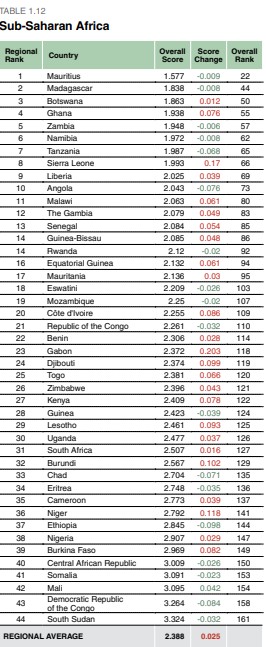Sub-Saharan Africa experienced a decline in peacefulness in the 2024 GPI, with the region’s average score worsening by 0.89% over the past year. It is the second least peaceful region, following MENA, and is home to three of the world’s ten least peaceful countries. The region is grappling with several security crises, particularly the rise in political unrest and terrorism in the Central Sahel area. Burkina Faso faces the highest impact of terrorism globally, and five of the ten countries most affected by terrorism are in sub-Saharan Africa.

The decline in peacefulness in sub-Saharan Africa was seen across all three GPI domains, with the most significant deterioration in the Ongoing Conflict domain. Conflicts in the region continued to cross national borders, leading to a worsening of the external conflicts fought indicator. Over the past five years, 36 out of the 44 countries in the region have been involved in at least one external conflict.
Mauritius remains the most peaceful country in sub-Saharan Africa for the 17th consecutive year. It leads the region in peacefulness across all three GPI domains and saw a slight improvement in peacefulness over the past year, driven by gains in the Safety and Security domain. Notably, the indicators for violent demonstrations and homicide rate showed significant improvements. Additionally, Mauritius is the only country in sub-Saharan Africa that has not been involved in any internal or external conflicts over the past five years.
South Sudan remains the least peaceful country in the region, despite a slight improvement in peacefulness over the past year. The number of deaths from internal conflict decreased by 73 per cent, dropping from 723 in 2022 to 199 in 2023. While there were improvements in both the Militarisation and Ongoing Conflict domains, the security situation remains precarious. The ongoing crisis in Sudan has significantly impacted South Sudan, complicating the return of refugees and potentially affecting the economy by disrupting oil exports.
Ethiopia saw the largest improvement in peacefulness in the region, thanks to the Tigray ceasefire agreement, which led to a significant reduction in deaths from internal conflict. In 2023, conflict-related deaths fell to just under 2,300. This marks a dramatic improvement from the 100,000 conflict-related deaths in 2022, the year that Ethiopia was the country with the highest number of conflict deaths. However, the security situation remains fragile. Despite the ceasefire agreement signed in late 2022, there were reports of mass killings by multiple parties across various regions in 2023. A state of emergency was declared in the Amhara region, with the federal government intensifying its military presence and employing curfews, mass detentions, and militarised patrols.
Gabon experienced the largest deterioration in peacefulness in sub-Saharan Africa, and the third largest worldwide. Significant declines were recorded in both the Ongoing Conflict and Militarisation domains. The fall in peacefulness was driven by increasing internal unrest, culminating in a military coup in August 2023 that overturned the results of the presidential election, ending the 56-year rule of the Bongo family. The international community, including the African Union and the United Nations, condemned the coup and called for a peaceful resolution and a return to constitutional governance.
Further reading: